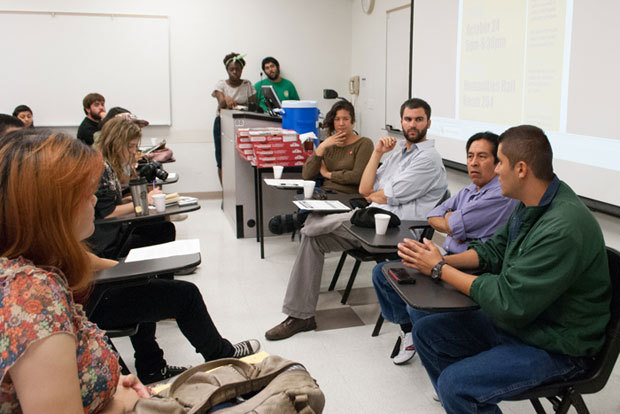Students Back Workers

Michelle Katie Licari
Fifty-six people turned out to attend the Workers’ Justice Town Hall on Thursday, Oct. 24, to educate themselves about workers’ rights and to become active in the workers’ rights movement on campus.
The event was hosted by ASUCI’s office of the Executive Vice President in conjunction with the Worker’s Justice Coalition. ASUCI Executive Vice President Melissa Gamble, and ASUCI EVP Labor Liaison and United Students Against Sweatshops Student Organizer, Lisa Lei, headed the meeting and introduced the panel of workers and organizers.
Before the panel began, Melissa Gamble began by stressing why students should be supporting the workers.
“It is important for students to show solidarity with the workers because the cuts that are affecting the students are also affecting the workers. The UC really views workers as invisible and replaceable and that isn’t right because you can’t replace a human. We constantly see the university undermine students but more so we see the university exploit workers,” Gamble said.
The speakers consisted of graduate students Jessica Conte and Tyson Patros from the academic student workers’ union UAW , Jorge Serrato and Oscar Martinez from AFSCME 3299 and the service workers.
The meeting was held to educate students about the difficult contract negotiations that occurred between the university administration and the university workers. Town Hall hosts and panelists gave background information about these negotiations and were allowed to ask questions to the panel. The main topic of this panel was the negotiations the workers have had with the university and the possibility of the workers going out on strike.
AFSCME 3299, the union representing the service workers at the UC, is voting this week from Monday to Wednesday to decide whether or not they will go on a system-wide strike. According to the AFSCME 3299 website, this is a strike addressing unfair labor practices.
Though the strike still needs to be authorized via voting before a date is set, organizers are optimistic that it will be approved by union members. If passed, a bargaining team will come to the table and decide a date for the strike to take place.
Jorge Serrato, the organizer for AFSCME 3299, spoke on the panel about the workers’ previous struggle with the UC.
The university has frozen service workers’ pay and decreased their take home pay by 1.5 percent, requiring them to contribute more to their pension. The university and medical center workers have complained about being chronically understaffed and often the workers have to do the work of two or three workers.
Serrato also translated for Oscar Martinez, a custodian at Mesa Court, who thanked the students for being there in support of the workers.
“[The workers] are also in support of the students. If there is anything that the students want from the workers we will be there. Because we know that at the same time that the university raises tuition and fees on all of you there are cut-backs on us. A lot of the workers ask themselves ‘What happens with all of that money?’ right ‘What does the university do with it?’ All of these executives keep on getting more and more; the workers and the students get less and less,” Martinez said. “For example, Mesa Court is planning on tearing down the Mesa dining hall and constructing a new building that will be about six or seven stories high with dormitories on top of the dining hall and the basement will be for the workers. So they ask themselves ‘Where does the university get all of this money.’ They keep on saying that they don’t have any money, they don’t have any money and they end up getting all of this money for donations. The workers though don’t think all of this money is coming from donations.”
The two graduate students on the panel, Jessica Conte and Tyson Patros, also discussed some projects they are working on such as gender neutral restrooms across the UC system and the inclusion of undocumented grad students. Their other projects consist of making better working conditions for TAs.
“As TAs, our working conditions are the university, our workplace is the university, so changes to our working conditions are changes to the university. Our contract covers everything from pay to benefits that we see as graduate students; it also covers other things at the UC,” Conte said.
“So when we are fighting for a more accessible workplace through the inclusion of undocumented graduate students, this is creating a more accessible university. When we ask for all gender bathrooms across the UC system, this is creating a more accessible university for everybody here. One of our big demands is also class size. We are trying to get a cap on the number of students that we can have in a class. We are effectively being paid less and less to do more and more work. This is affecting the education of the undergrads who come here.”
[Source]: New University


